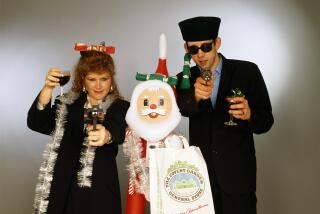Hari Kunzru’s digital tone poem of New York
When the British novelist Hari Kunzru moved to Manhattan in 2008, he found himself unmoored. “I only got here a couple of weeks ago,” he writes in “Twice Upon a Time: Listening to New York” (Atavist Books: digital, $2.99). “Nothing but a stranger in this world. Every time I exit the subway I have to make a 360-degree turn to work out which direction is downtown. I need a guide.”
What he’s referring to is less practical (“Foodies have Zagat, swingers have Adult Friend Finder”) than philosophical, spiritual, experiential, a way to get inside the city’s soul. For Kunzru, this meant the legendary street performer Moondog, “aka Louis Hardin,” a blind percussionist, composer and poet who had been a fixture on the corner of 53rd Street and Sixth Avenue from the 1940s through the 1970s, but was long since dead before the author got to town.
------------
FOR THE RECORD
11:54 a.m. May 21: An earlier version of this post misquoted three words in a passage from “Twice Upon a Time.” The word “Reggaetron” should be “Reggaeton”; the word “clusters” should be “clustered”; and the word “places” should be “plays.”
------------
“Twice Upon a Time” is a record (no pun intended) of Kunzru’s exploration, a kind of three-dimensional tone poem of city life. Using Moondog’s music as a soundtrack — he recorded more than a dozen albums over the years and was championed by musicians as diverse as Charlie Parker and Leonard Bernstein, Benny Goodman and Philip Glass — it recreates New York as a random pastiche of music, conversation, traffic noise, all adding up to its own ecstatic symphony.
“[W]alking towards the subway,” Kunzru tells us, “I pass an auto-repair place. A group of men are playing cards on the sidewalk, listening to Reggaeton pumped out of a system somewhere in the back. Squat Negro Modelo bottles are clustered on the crate they’re using as a table. Down the street is a tortilla factory where women in white smocks and plastic caps are working a late shift. … Machinery whirs and thuds. A radio plays Spanish-language love songs.”
To evoke this collage-like quality, these juxtapositions, “Twice Upon a Time” relies on jagged jump cuts between Kunzru’s vision of the city and the story of Moondog’s life. The music, which we hear as we move screen to screen throughout the e-book, helps to unify the narrative.
There are few digital bells and whistles, just a subtle interaction with the technology. After Kunzru describes the accident that took Moondog’s sight as a 16-year-old, for instance, the screen explodes from white to black.
As for the connection between them, it is loose, elusive, but also personal. “My brother is blind,” Kunzru tells us. “This is one of the major dynamics of my life. His blindness, my sight. I can only imagine how it would feel to negotiate this city as a blind person. The open delivery hatches in the sidewalk, the fierce commuters. With so much uncertainty, so much to go wrong, there’s a need to make your own certainty, to find a system.”
This, of course, is true of Kunzru also, who as a newcomer is engaged in a similar negotiation of his own. “Maybe this city is over,” he writes, lamenting the death of authenticity, “the reverse Midas touch” of hipster culture, in which ‘”[o]nce a thing is ... blogged about, uploaded, it’s immediately commercialized, branded and sanitized, then sold back.”
In some sense, this echoes the themes of Kunzru’s novels, which operate out of the tension between what we see and who we are. But even more, it speaks to the essential disconnect of living in the city, the way we both construct and deconstruct our narrative every time we walk the streets.
“My recordings are interrupted by bursts of sudden static, when the sleeping baby wakes up and jerks the mikes violently out of my ears,” Kunzru insists in a brief coda written from the present, after having spent six years living in New York.
Time, in other words, may change us, but the soundscape of the city remains.
More to Read
Sign up for our Book Club newsletter
Get the latest news, events and more from the Los Angeles Times Book Club, and help us get L.A. reading and talking.
You may occasionally receive promotional content from the Los Angeles Times.







